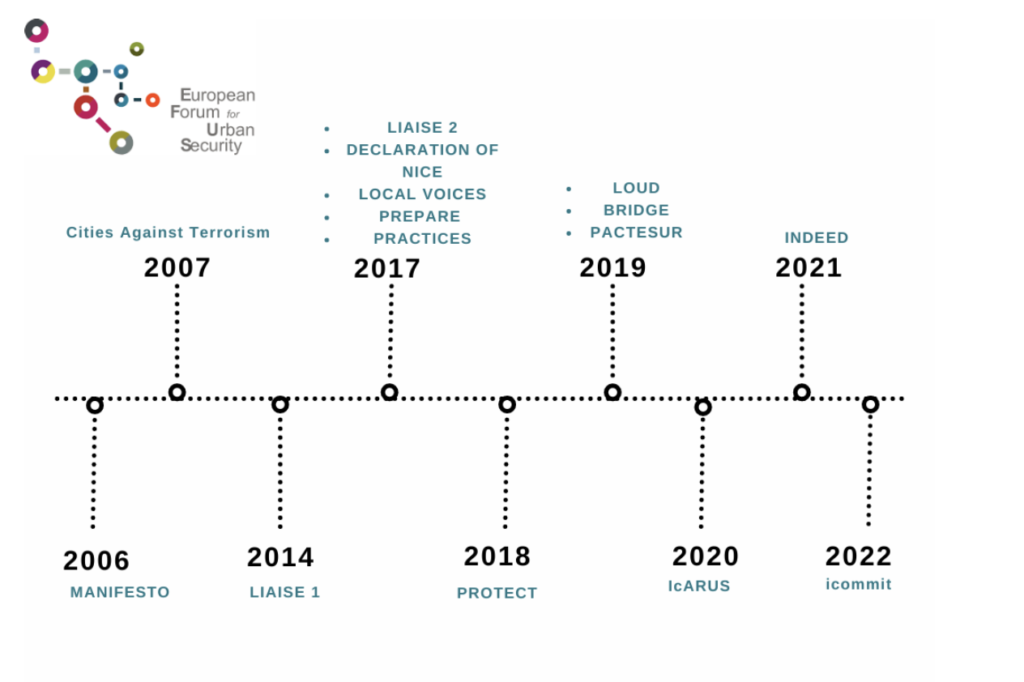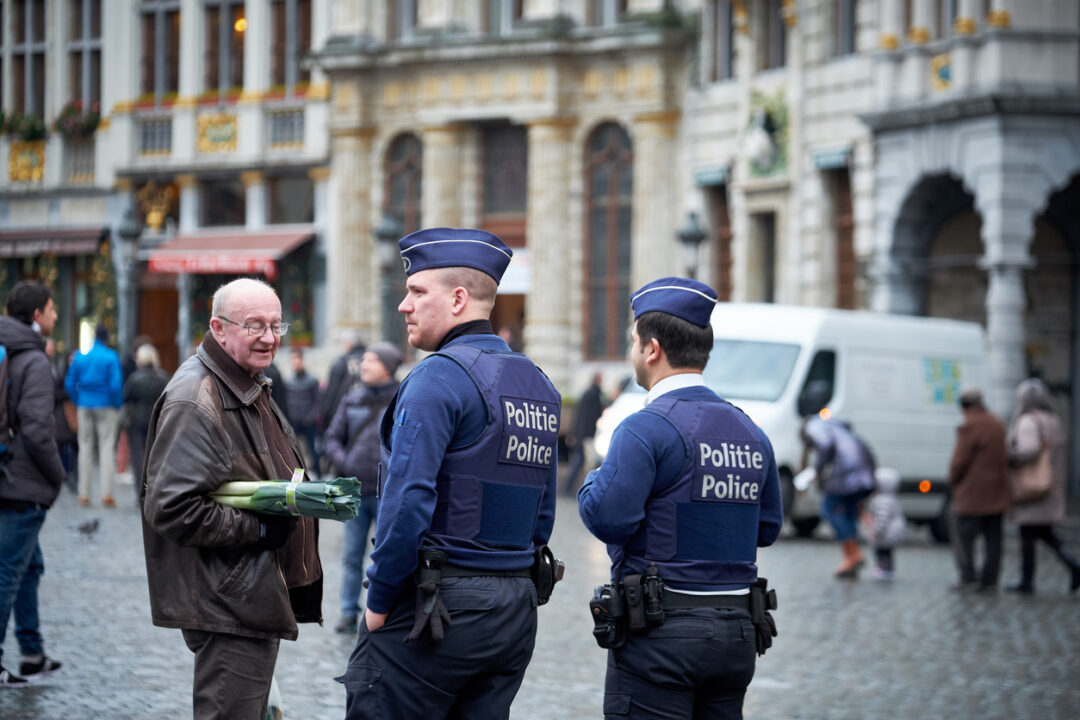July 2023 – The European Forum for Urban Security (Efus) has been working on the issue of radicalisation leading to violent extremism since the early 2000s, in the wake of a series of terrorist attacks against European cities (Madrid 2004, London 2005, Paris 2015, Nice 2016, Brussels 2016, Manchester 2017…). Efus works on all forms of violent radicalisation whether linked to religious, Islamist extremism, or the extreme right and hooliganism.
2007 – Cities against terrorism
Shortly after the Congress of Local and Regional Authorities of Europe adopted, in 2003, a resolution on “the role and responsibilities of local authorities [in] tackling terrorism”, Efus started the ‘Cities Against Terrorism’ project, which resulted in the publication of Secucities – Cities Against Terrorism.
The project sought to highlight and promote the prominent and indisputable role of local actors in countering terrorism. It is the cornerstone of all the initiatives Efus has since led on this issue.
Defending democracy
In Secucities – Cities Against Terrorism, Efus affirms that, “in tackling terrorism, local elected officials and local authorities play a key role in terms of the immediate response to a terrorism act and crisis management as well as in developing public solidarity and community relations in the long term, as the most recent experiences of New York, Madrid and London have shown. […] Cities have a role to play in the global effort to eliminate terrorism. This role doesn’t involve taking part in a war but involves fighting to defend the values of democracy.”
The link between security and freedom
Indeed, Efus and its member cities consider it essential to guarantee the indivisibility of fundamental rights when countering and preventing violent extremism. In this respect, it is fundamental to preserve both freedom and security because they go hand in hand. This means that citizens shouldn’t be asked to make an impossible choice between safety and freedom.
Avoid stigmatisation
This also means that fighting all forms of violent extremism should be done in a balanced and responsible manner, avoiding the stigmatisation of any group of population. This requires consistent and respectful communication and a determination to unite rather than divide people.
Unchanged principles
Efus has defended and promoted these principles over the years through its regular exchange activities (conferences, seminars…) and projects that benefit its member cities, the majority of which are co-funded by the European Union. These principles are laid out in the Security, Democracy and Cities – Co-producing urban security policies Manifesto.

Practical tools
Now, Efus member local and regional authorities all agree on these fundamental principles, but their main concern is how to locally prevent radicalisation leading to violence. This is why Efus leads or takes part in numerous projects aimed at providing local authorities with practical tools.
Thus, in 2013, it became a partner in a project led by the Belgian Ministry of the Interior, titled BOUNCE, which seeks to develop tools helping young people to be more resilient in the face of extremist discourses.
Methodological guidebook
The following year, Efus designed the LIAISE (Local Institutions Against Extremism) project, which was later continued with LIAISE 2, with the support of the European Commission. The project seeks to build the capacities of local and regional authorities to prevent radicalisation.
It resulted in the publication of Preventing and Fighting Radicalisation at the Local Level, which includes a series of promising practices and practical recommendations, and which is accompanied by a Methodological guide for the development of a local strategy.
Wider scope
In the past few years, Efus has expanded its research to include the phenomenon of polarisation, which underlies violent radicalisation and is amplified by social media. It notably did so through the BRIDGE European project, which resulted in the publication of Understanding and addressing polarisation at the local level.
Furthermore, Efus is furthering its ongoing work on diagnosis and prevention tools that can be of use for local and regional authorities. As such, one of the four research areas of the IcARUS project, which Efus has been conducting since 2020, is the prevention of violent radicalisation. This project builds on 35 years of local urban security policies to re-think, re-design and adapt the tools and methods that local and regional authorities can use to better anticipate and respond to security challenges.
Improving the work methodology
Since respectively 2021 and 2022, Efus has been a partner in two European projects, INDEED and icommit, whose objectives are to improve the work methodology used by practitioners and political decision-makers working on preventing and countering violent extremism.
INDEED seeks to improve the design, planning, implementation and evaluation of initiatives that seek to prevent and counter violent extremism. icommit (which is spelt in lower case) seeks to train actors operating in the disengagement and reintegration of extremists in working in a multi-stakeholder environment. It offers models and an interactive training programme.
Supporting 250 European cities
Efus is conducting this work in coordination with the significant work carried out by national governments and international institutions such as the European Union and the United Nations. Furthermore, it regularly exchanges with other networks such as the EU’s Radicalisation Awareness Network (RAN) and the Strong Cities Network.
Today, Efus occupies a unique position as a forum where 250 cities and regions from 16 European countries can exchange and find support. Efus aims at providing them with tools to better understand and act in the face of a complex issue that is constantly evolving.
> Further reading:
· LOUD – When local authorities and young people from nine European cities mobilise against intolerance and extremism (Efus, 2021)
· BRIDGE – Understanding and addressing polarisation at the local level (Efus, 2021)
· PRACTICIES – Partnership Against Violent Radicalisation in Cities, European project (Efus, 2020)
· PREPARE – Preventing Radicalisation in Probation and Release (Efus, 2019)
· Prevention of violent radicalisation – Methodological guide for the development of a local strategy (Efus, 2017)
· Preventing and Fighting Radicalisation at the Local Level (Efus, 2016)· Cities against Terrorism (Efus, 2007)



